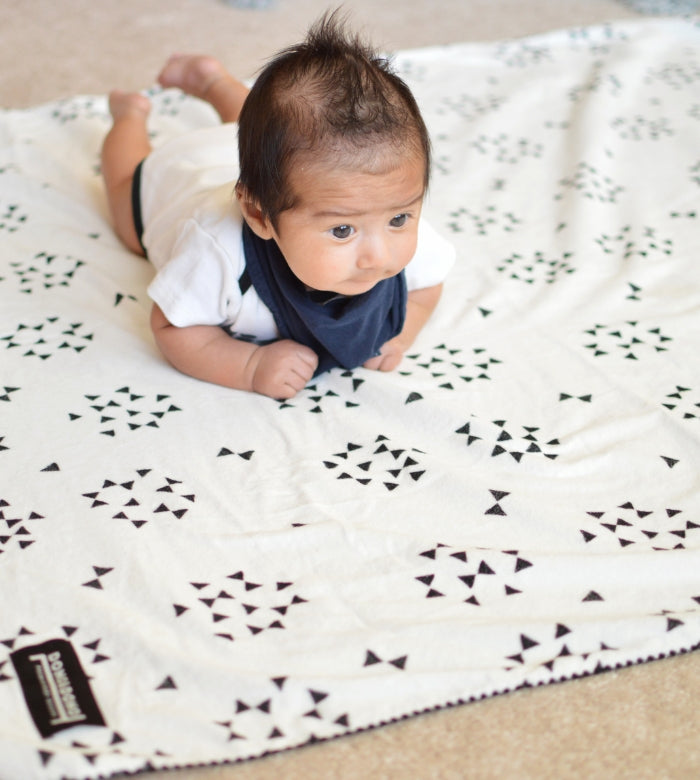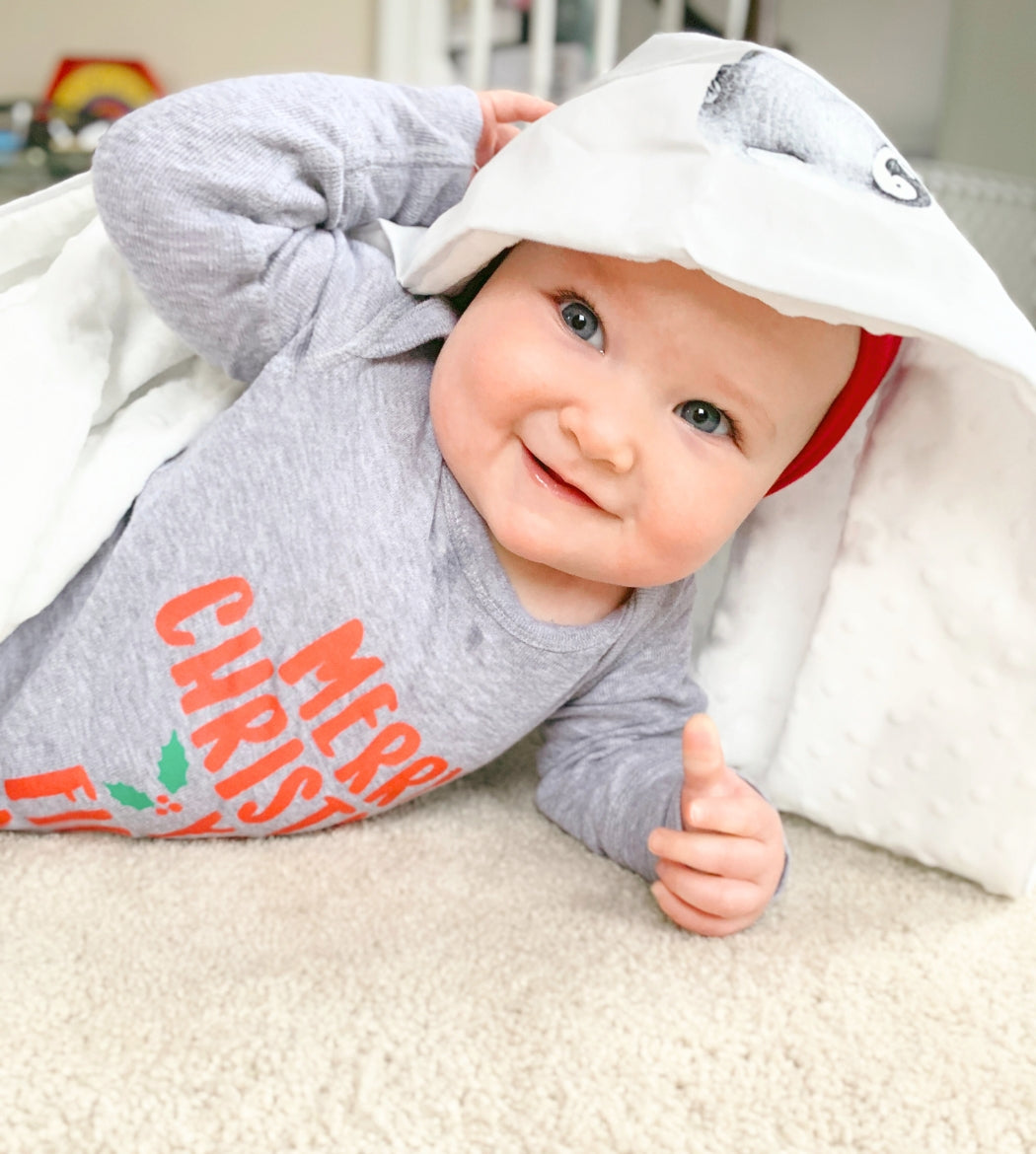Is Your Teething Baby Having Trouble Sleeping?
Being a baby is tough work! Growing, learning, teething, and developing all come along with their own aches and pains. One of the most difficult parts about having a teething baby, aside from seeing them in pain, is dealing with sleepless nights. Luckily, there is plenty you can do to help your little one—and you!—get a good night’s sleep. Keep reading to learn more about infant sleep disturbances while teething and tricks to help your baby get back to snoozing, including using our oral development sensory toys.
Why Won’t My Teething Baby Sleep?

Plain and simple: Your teething baby isn’t sleeping because they are uncomfortable.
According to the Sleep Foundation, unfortunately for babies and their caregivers, teething can cause pain and discomfort, making it hard to sleep. In fact, scientific evidence suggests that more than 80% of infants and toddlers experience sleep disturbances when they are teething. While teething schedules can vary significantly, most babies break their first tooth around 6 months of age, and all 20 “baby teeth” usually emerge by the time a child is 2.5 years old. Teething doesn’t happen constantly during this time. Instead, teeth emerge intermittently, sometimes in pairs or clusters. [source: https://www.sleepfoundation.org/baby-sleep/do-babies-sleep-more-when-teething ]
Even the best of nappers and night sleepers will experience a disturbance while teething, and it can take a while to get back on track. It’s important to remember, however, that it is only temporary, and your baby WILL get back to sleeping soon!
Teething vs Sleep Regression
Sleep regressions happen throughout infancy. These sleep regressions, while difficult to deal with, are totally normal and developmentally appropriate for all babies when they occur. Since it can be difficult to know whether or not your baby is teething,

here are a couple of tricks to know whether you’re experiencing a sleep regression or teething pain:
Teething |
Sleep regression |
|
|
|
|
How Long Does Teething Pain Last?
There is no cookie-cutter answer for how long teething pain lasts. Babies experience teething pain completely differently, from baby to baby and tooth to tooth. Often times, babies have teeth pop up in clusters, which can make things more painful, or they can have just one pop up that isn’t as painful. Some teeth, like the molars, can take a long time to emerge compared to some other teeth that don’t take as long to emerge.
As mentioned earlier in this blog, teething usually begins around 6 months of age (sometimes earlier and sometimes later!), and usually ends when your baby is a toddler at 2.5 or 3 years old. Luckily, by the later stages, your toddler can tell you why they are hurting.
Signs of Teething

If you’re wondering whether your baby isn’t sleeping due to a sleep regression, teething, or some other reason, here is a list of teething symptoms to help you rule things out:
- Increased drooling (just when you thought there couldn’t be more!)
- Red, swollen gums
- Increased biting, chewing, and oral fixation
- Fussiness
- Ear rubbing
- Loss of appetite
- A slight fever (shouldn’t be above 100.4)
- Sleep disturbances (Bingo!)
Note that not all babies experience all symptoms of teething, which makes the guessing game even more fun—not!
Ways to Help Your Teething Baby
Luckily, there are plenty of ways you can help your teething baby get through a rough night. Some of our tips include gum massages, cold items, lots of cuddles, pain relievers, and Oral Sensory Development Toys.

Gum Massages
When your baby is teething, their gums are swollen, tender, and uncomfortable. They also have an intense urge to put something in their mouth and bite down to help relieve the pain. When they are in their crib, in the dark, it can be difficult for them to fulfill this need. As such, giving your baby a soothing gum massage can help them get the relief they need so that they can get back to sleep—for now.
Cold Items
If your baby is super fussy and needs more than just a gum massage, keep some Oral Development Teethers in your freezer. Cold items will help reduce swelling and offer some much-needed pain relief from teething in the middle of the night.
Lots of Cuddles
When your baby is in pain, sometimes the only thing that makes them feel better is some serious cuddle time with Mom or Dad. Snuggle up with your baby for a bit to see if the comfort helps get them back to sleep.
Pain Releivers
If it seems like your baby is really struggling, you can offer them some pain relief through medication. According to Children’s Hospital Los Angeles, the safest choice is acetaminophen (Tylenol) for babies 2 months and older. Ibuprofen is not recommended for children until they are at least 6 months of age. Follow the directions on the label for your child’s age and weight.
Innobaby Oral Sensory Developmental Toys
Teething is tough and, as mentioned a few times throughout this blog, it makes your baby feel so much better when they are able to soothe their gums by biting down on something. If you’re going to offer your baby something to chew on while teething, make sure it is safe, developmentally beneficial, and easy for them to use.
Innobaby holds its teethers to the very highest standards to conform to Toy Safety Standard ASTM F963 and EN71 and uses the highest quality TPE available. Innobaby wants the best for your baby, just like you! Other teethers may be too small or break apart easily, but you can trust ours.
For more teething tips and safe everyday stuff for your baby and entire family, visit us at Innobaby.com!







